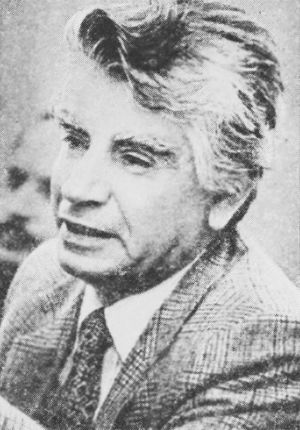Leopoldo Zea Aguilar facts for kids
Quick facts for kids
Leopoldo Zea Aguilar
|
|
|---|---|
 |
|
| Born | June 30, 1912 |
| Died | June 8, 2004 (aged 91) |
| Era | 20th-century philosophy |
| Region | Western philosophy |
Leopoldo Zea Aguilar (born June 30, 1912 – died June 8, 2004) was an important Mexican philosopher. He is known for his ideas about Latin America and its place in the world. Zea believed in bringing Latin American countries closer together. He also studied how ideas and history are connected.
Contents
About Leopoldo Zea's Life
Leopoldo Zea was born in Mexico City. He came from a family that didn't have much money. In 1933, he worked at the Telégrafos Nacionales office. This job helped him pay for his high school and university education.
Zea's Big Ideas and Studies
Zea became famous for his master's thesis, El Positivismo en México (Positivism in Mexico). He wrote this in 1943. In this work, he looked at positivism in Mexico and the world. Positivism is a way of thinking that focuses on facts and scientific proof.
Zea used his studies to support the idea of Latin American integration. This means bringing Latin American countries closer together. This idea was first suggested by Simón Bolívar, a famous leader. Zea gave it his own meaning, especially when thinking about neocolonialism. Neocolonialism is when powerful countries still control weaker ones, even without direct rule.
Zea believed that historical events are not separate from ideas. He showed that big changes in history often come from simple reactions to human situations.
Understanding Latin American Identity
Zea had a strong vision for a united Latin America. He believed in understanding the true place of people in the region. He explained that the "discovery" of America in 1492 was more like a "concealment." He meant that the cultures and knowledge of the people already living there were hidden. He talked about this idea in 1992, 500 years after 1492.
Later, he studied the ontological analysis of Latin America. This means he looked deeply at what it means to be Latin American. He studied this from cultural and historical points of view.
Zea's Career at UNAM
Leopoldo Zea worked at the National Autonomous University of Mexico (UNAM) for many years. He started there as a professor and philosopher in 1943. In 1947, he helped create the Faculty of Philosophy. He also gave lectures on the history of ideas in America.
In 1954, he became a full-time researcher at the Philosophical Studies Center. He then became the director of the college in 1966. He held this important job until 1970. While director, he started the Latin American Studies College in 1966. Later, in 1978, he founded the Coordination and Propagation Center of UNAM Latin American Studies.
Awards and Recognition
Zea received many important awards for his work. These include the Premio Nacional de Ciencias y Artes in 1980. He also got the Premio Interamericano de Cultura "Gabriela Mistral" from the OAS. In 2000, he received the Medalla Belisario Domínguez from the Senate of Mexico.
Three years before he passed away, UNAM honored him. They recognized him as the oldest professor who worked continuously until his death.
Zea's Impact and Legacy
Leopoldo Zea's ideas were often compared to other important thinkers. These included Germán Arciniegas, Che Guevara, and Simón Bolívar.
His philosophy focused on a united Latin America. He saw this not as a dream, but as something real and possible. He believed in continuing the fight for people to achieve this change. His work opened up discussions for many other scholars in the future.
See also
 In Spanish: Leopoldo Zea Aguilar para niños
In Spanish: Leopoldo Zea Aguilar para niños
 | John T. Biggers |
 | Thomas Blackshear |
 | Mark Bradford |
 | Beverly Buchanan |

